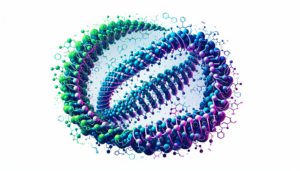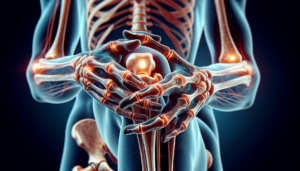The Role of CoQ10 in Aging: What You Need to Know
The Role of CoQ10 in Aging: What You Need to Know
Understanding CoQ10: A Brief Overview
Coenzyme Q10, or CoQ10, is a powerful antioxidant that naturally occurs in the body. It plays a critical role in the production of adenosine triphosphate (ATP), which is essential for cellular energy. CoQ10 is found in the highest concentrations in the heart, liver, kidneys, and pancreas. As humans age, the levels of CoQ10 decline, which can impact various bodily functions and overall health.
The Biochemistry of CoQ10
CoQ10 functions at the mitochondrial level — the powerhouse of the cell. It is essential for the electron transport chain, where it facilitates the transfer of electrons, leading to ATP synthesis. In addition to its role in energy production, CoQ10 helps mitigate oxidative stress by neutralizing free radicals, thus protecting cellular integrity.
Aging and CoQ10 Levels
Research indicates that as individuals age, their endogenous production of CoQ10 decreases. By the age of 40, CoQ10 levels in the body may decline significantly, potentially leading to various age-related health issues. This decline has been linked to increased oxidative stress and mitochondrial dysfunction, both of which contribute to the aging process.
Antioxidant Properties of CoQ10
A major benefit of CoQ10 is its antioxidant potential. Antioxidants are vital for combatting oxidative stress associated with aging. Oxidative stress can lead to cellular damage, inflammation, and a greater risk of chronic diseases, such as cardiovascular disease and neurodegenerative disorders. CoQ10 aids in scavenging free radicals while also regenerating other antioxidants like vitamins E and C, enhancing the body’s defense system against oxidative damage.
CoQ10 and Cardiovascular Health
One of the most studied areas of CoQ10 is its impact on cardiovascular health. CoQ10 supplementation has shown promise in improving heart function, especially in individuals with heart disease. It assists in maintaining healthy blood pressure levels and enhances endothelial function, which is crucial for maintaining vascular health. Studies suggest that CoQ10 can improve symptoms of heart failure and reduce the risk of cardiovascular events.
CoQ10 and Mitochondrial Function
Mitochondrial dysfunction is a hallmark of aging and has been implicated in numerous age-related diseases. CoQ10 helps maintain mitochondrial integrity and function. Research indicates that by supplementing with CoQ10, individuals may improve energy production within cells, which can combat fatigue and improve overall vitality as they age.
CoQ10 and Neurodegenerative Diseases
The decline of CoQ10 levels has been associated with neurodegenerative diseases, including Alzheimer’s and Parkinson’s. Inflammation and oxidative stress are common features of these diseases. CoQ10’s role as an antioxidant may help protect neurons from damage and improve cognitive function. Preliminary studies suggest that CoQ10 supplementation might slow the progression of these diseases, warranting further investigation.
CoQ10 in Metabolic Health
Aging often leads to metabolic dysfunction, including insulin resistance and obesity. CoQ10 may help improve metabolic outcomes by enhancing the efficiency of energy metabolism and reducing oxidative stress in adipose tissue. Studies have suggested that CoQ10 supplementation can improve insulin sensitivity, supporting metabolic health and weight management.
CoQ10 Supplementation: Types and Dosages
CoQ10 supplements primarily come in two forms: ubiquinone and ubiquinol. Ubiquinone is the oxidized form, while ubiquinol is the reduced, active form that is more bioavailable. Research suggests that ubiquinol may be more effective, particularly in older adults. The recommended dosage varies, but studies commonly use a range from 100 to 600 mg per day. It is essential to consult with a healthcare provider before starting any supplementation regimen.
Potential Side Effects and Interactions
CoQ10 is generally considered safe, with few reported side effects, which may include digestive issues or mild insomnia. However, individuals taking blood-thinning medications, statins, or those with specific medical conditions should seek medical advice before starting supplementation. CoQ10 may interact with certain drugs, influencing their effectiveness or side effects.
CoQ10 and Overall Aging Wellness
CoQ10 plays a versatile role not just in energy production and antioxidant defense, but also in supporting multiple organ systems, including cardiac, neurological, and metabolic health. As individuals seek ways to enhance their well-being during the aging process, CoQ10 emerges as a promising candidate for addressing age-related decline.
Lifestyle Factors Influencing CoQ10 Levels
Several lifestyle factors can affect CoQ10 levels. Regular physical activity has been associated with increased CoQ10 synthesis, while poor dietary choices and certain health conditions can reduce levels. Diets rich in healthy fats, whole grains, and lean proteins can provide the building blocks necessary for the body to maintain adequate CoQ10 levels.
Foods High in CoQ10
Incorporating foods high in CoQ10 can support endogenous production. Some excellent dietary sources include:
- Fatty fish: Such as salmon and mackerel
- Meats: Such as beef, pork, and chicken
- Nuts and seeds: Especially peanuts and sesame seeds
- Vegetables: Spinach, cauliflower, and whole grains
Adding these foods to a balanced diet can help enhance CoQ10 levels through natural pathways.
CoQ10: A Comprehensive Anti-Aging Strategy
Integrating CoQ10 supplementation into a broader anti-aging strategy has gained traction among health enthusiasts and researchers alike. When combined with other lifestyle modifications — like regular exercise, a healthy diet, adequate sleep, and stress management — CoQ10 supplementation can contribute to a holistic approach to aging well.
Conclusion
The potential benefits of CoQ10 in relation to aging continue to unfold through ongoing research. As awareness about oxidative stress and mitochondrial health grows, so does the appreciation for CoQ10’s role in aging gracefully. Emphasizing a balanced diet, regular activity, and appropriate supplementation can help individuals harness the power of CoQ10 to maintain vitality and health as they age. Incorporating CoQ10 into daily wellness routines may emerge as a key component in the pursuit of longevity and quality of life.








